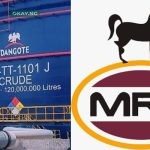Africa’s largest oil refinery, a cornerstone project of Nigerian billionaire Aliko Dangote, is poised to achieve full operational capacity within the next month, according to a top company official. This landmark achievement comes amidst ongoing challenges in securing adequate domestic crude oil supplies, highlighting the complexities facing the burgeoning Nigerian energy sector.
Edwin Devakumar, the vice president of the Dangote Refinery, revealed in an interview with Reuters that the facility, located in the Lekki Free Zone near Lagos, has ramped up production significantly since its initial operations. “The refinery is currently running at 85 percent capacity, and we can reach 100 percent in 30 days,” Devakumar stated. This signifies a critical milestone for the refinery, which began refining crude into diesel, naphtha, and jet fuel last January, with petrol production commencing in September.
Once fully operational, the Dangote Refinery aims to be a major player in the global refining market, potentially competing with established European refiners. However, the ambitious project has encountered obstacles, primarily related to securing a consistent supply of crude oil from domestic sources. Despite an agreement with the Nigerian government to purchase crude in naira, the refinery was compelled to resort to imports last year due to insufficient local availability. This situation underscores the critical need for a robust and reliable domestic crude oil supply chain to support the refinery’s operations and maximize its contribution to the Nigerian economy.
Read Also: Nigeria’s Fuel Imports Plummet as Dangote Refinery Disrupts Global Trade
The Nigerian National Petroleum Company (NNPC) has taken steps to address this issue, warning oil producers that they will face export permit restrictions if they fail to meet their domestic supply obligations. This move aims to incentivize increased domestic crude oil production and ensure that the Dangote Refinery, and other domestic refineries, have access to the necessary raw materials.
While navigating these supply chain challenges, the Dangote Refinery is expanding its market reach. The company recently announced its first international fuel exports, shipping two cargoes of jet fuel to Saudi Aramco. “We are looking at all the markets right now,” Devakumar confirmed, signalling the refinery’s ambitions to become a significant player in the global fuel market.
Impact
The Dangote Refinery project represents a significant investment in Nigeria’s economic future, with the potential to create jobs, stimulate economic growth, and reduce the country’s reliance on fuel imports. However, the challenges faced in securing adequate domestic crude oil supplies highlight the broader economic and infrastructural issues that continue to hinder Nigeria’s development.
The success of the Dangote Refinery hinges not only on its technological capabilities but also on the government’s ability to create a supportive environment for the oil and gas sector, including ensuring a stable and reliable supply of crude oil, improving infrastructure, and addressing issues of corruption and regulatory uncertainty.












